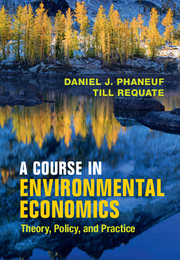PART III - VALUING THE ENVIRONMENT
Published online by Cambridge University Press: 27 February 2023
Summary
Throughout Parts I and II of this book we have referred to damage, abatement cost, profit, and other economic functions in our discussion of environmental policy. As we have seen, these functions arise from household preferences and firm production technologies, and are therefore usually not directly observable. Nonetheless, to this point we have assumed regulators and other agents possess knowledge of these functions or estimates thereof, and conditional on this, we have proceeded with our mostly theoretical discussion of policy design. In Part III, we turn our attention to methods that have been developed to estimate the damage and cost functions needed to implement policy. With this, our emphasis switches to examining models of individual and household behavior, since the measurement concepts of interest usually arise out of individuals’ interactions with the environment. Furthermore, Part III of the book has a greater emphasis on econometrics, since our discussion will also examine ways that these models can be brought to data to produce empirical results.
The themes we discuss in Part III are usually referred to collectively as the sub-field of non-market valuation. The general problem of non-market valuation is to compute a monetary value for environmental resources or services that, in the general setup of market economies, are not subject to exchange, and therefore do not have an observable market price. For example, we might be interested in knowing the monetary value of preserving a wooded area in an urban landscape, relative to its value in a residential use. Likewise, large-scale biodiversity preserves usually preclude extractive use, such as mining and timber harvest, within the boundaries of the preserve. What is the monetary value of the biodiversity protection relative to the market value of the forgone minerals and lumber? To answer this and similar questions, conceptual models that connect the environmental resource to people's preferences (or in some cases firm profits), and econometric approaches that connect data to the conceptual models, are needed.
For this our starting point is neoclassical welfare theory, as it was when we started the book. This helps us to stress that the valuation problem should not be viewed as separate from the policy design problem in Part II, since they are two sides of the same coin.
- Type
- Chapter
- Information
- A Course in Environmental EconomicsTheory, Policy, and Practice, pp. 389 - 390Publisher: Cambridge University PressPrint publication year: 2016



